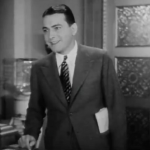 |
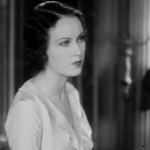 |
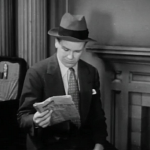 |
| Breckenridge Lee Richard Barthelmess |
Marcia Fay Wray |
Breezy Reegis Toomey |
Proof That It’s Pre-Code
- Sweet drinkin’.
- Sweet, sweet premarital sex.
The Finger Points: It Points for Thee
“You can’t kill a reporter.”
That’s the mantra of The Finger Points, a pre-Code drama that’s one of the earliest of Warner’s ‘ripped from the headlines’ fare. Based on the true story of a reporter who was extorting Al Capone’s mob, this fictionalized version stars Richard Barthelmess as a reporter in the big city discovering that his leverage over the cartels can work to his advantage– so long as that mantra holds true.
But let’s get back to the beginning, where Barthelmess’ Bruck is just getting started out at the big city newspaper. He quickly befriends Marcia and Breezy, the former being a beautiful reporter and the latter being a good pal with an eye on Marcia and a drive to avoid hard work at all costs.
After the newspaper vows to redouble its efforts to fight graft, Bruck nails a big story on a new gambling parlor. In revenge, the local mafioso has him taken into a dark alley and beaten mercilessly. When the newspaper refuses to cover his medical bills, he’s up the creek with very few paddles to choose from.
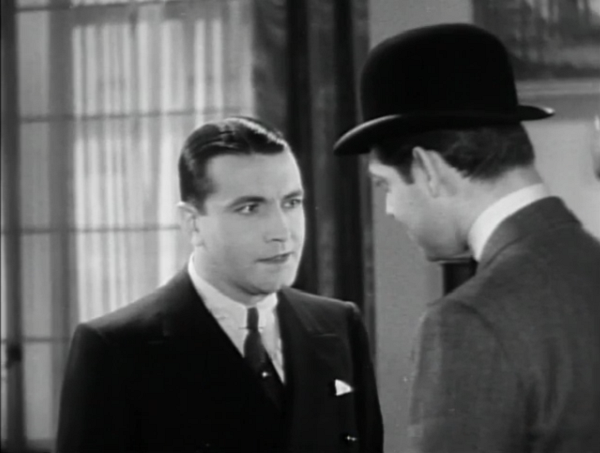
“You’re going to threaten *me*? Who do you think you are, Clark Gable? … wait, you are Clark Gable. Well, that means nothing in 1931!”
Bruck goes with option B: tell the mob about the tips he’s getting at the newspaper and take their money not to print what he hears. He starts out doing it just for the money, but soon its extended to transforming his entire lifestyle– how many journalists have you heard of that have their own valets? Soon he even manages a justification for his actions: “The racketeers terrorize the public. I terrorize the racketeers.”
Marcia almost buys that one, but she’s still disappointed that the moral crusader she knew from the beginning of the film turned out to be just another crook in a sea of ’em. Breezy has long had a thing for her, and she agrees to give him a shot if he gets off his butt and actually tries to break a story.
Little do either realize that Bruck has just gone and talked to the highest ranked man in the mob about covering up a nearby small town named Waverly that has basically been converted into a den of vice. For $100,000, he’s promised to keep it out of the papers. Number One shakes his finger at him and reminds Bruck what happens if he doesn’t keep his promises.
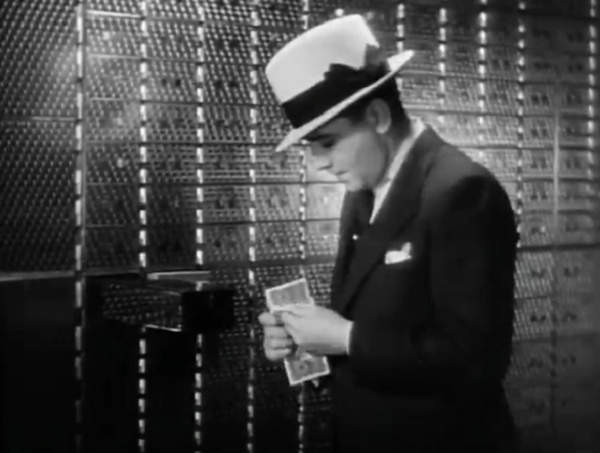
“Look at all this money. What could possibly go wrong!”
We only glimpse the aptly titled ‘Number One’ from the back, but judging from his frame and rings, it’s not difficult to suss out who the movie implies it to be. Capone was big in the public’s imagination at the time, and no doubt he was himself pleased to find another movie projecting his oversized shadow over the city of Chicago.
But, after accepting the bribe, Bruck’s conscience grows three times that afternoon, though, and he goes to Marcia and asks her to forgive him. She agrees so long as they leave the city in the morning. He acquiesces as long as she lets him spend the night, which he most certainly does. And meanwhile Breezy is working on this big story he heard about, a town of sin named Waverly…
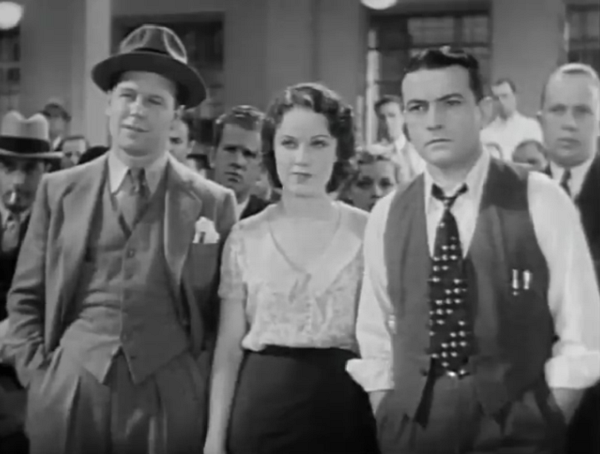
The Three Musketeers of digging themselves into a whole pile of crap.
Spoilers.
The poetic irony of Bruck’s consummation of love with Marcia dooming him to die isn’t lost on the movie, which waits until its last few minutes to demonstrate a considerable streak of black comedy. Arriving in the morning with the expose that will kill Bruck splashed on the front page, Breezy shows Bruck the headline but is crushed when he hears that Marcia has already agreed to marry Bruck. He intones, “You lucky stiff.”
Bruck knows his days are numbered, though. Marcia, the only other straight person who knows about his dirty dealings outside of the mob, begs him not to go out. He gets a smirk on his face, though, still believing that they can’t get away with killing a reporter. If they do, that’ll bring the whole town down on them. And maybe that wouldn’t be so bad after all.
On the vacant streets, he turns a corner and bumps into a preacher, who smiles and nods. “It wasn’t your fault, son.” A few seconds later Bruck is gunned down, and the city mourns who they believe to be a martyr in the war on crime. The mobsters laugh it off, and Marcia can only look out the window as the funeral parade goes by, watching her dreams of the future slip away with it.
End spoilers.
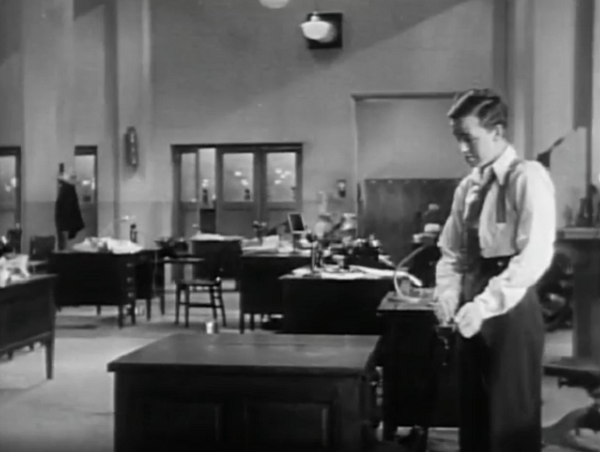
Empty newsroom, empty hearts.
The Finger Points isn’t just looking at how a person’s public life and personal life can wildly diverge, but it also examines the layers of extortion necessary to keep the bootlegging industry functioning: weak politicians, indifferent police, and frightened journalists. Framing Bruck’s corruption into a moral grey area is tough to buy, especially the ease with which the character does it. His final fate goes a long way towards redeeming him, but it’s still tough to look at a guy who’s suddenly wealthy and flaunting it in the middle of the Depression and go, “Oh, yeah, he’s doing the right thing.”
The Finger Points often reminded me of The Doorway to Hell, another pre-Code from Warner Brothers that was early to the table and suffered for it. Both have good stories, but both are stuck being in an awkward sort of way where each line has an unnatural pause following it.
The only performer who isn’t going at a glacial pace is Clark Gable, who plays one of the gangsters. Regis Toomey’s performance, on the other hand, is pretty much the same as a cheese grater going to town on the audience’s nerves. Story beats also seem slowed down incessantly as well, where a long conversation with Bruck trying to be recompensed for his injuries suffered for being beaten being interrupted literally every other line with an editor taking a phone call.
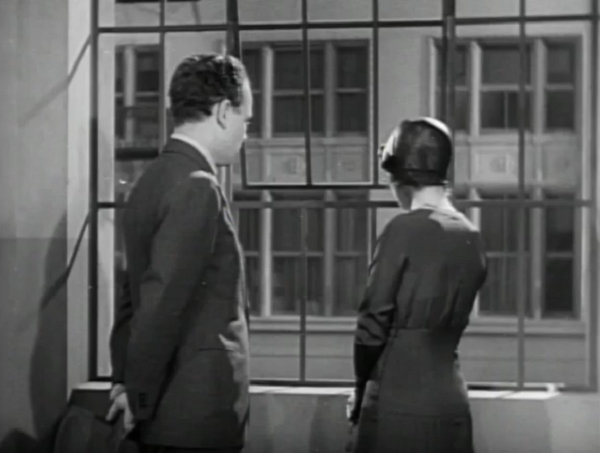
Adios, sucker.
It doesn’t help that the film grinds through its melodrama with such predictability that you can’t help but mutter “You dumb son of a bitch” every time Bruck makes a decision. It’s a rough outing, one that’s aged especially poorly. While there’s some nuggets of fascination, the film has such a rough edge to its technical side that it too often feels like a chore rather than the engaging melodrama one would hope for.
Gallery
Here are some extra screenshots I took. Click on any picture to enlarge!
Trivia & Links
- Mordaunt Hall for the New York Times (scroll down, it’s the second entry) is a bit schizo on this one. He praises the movie for its melodrama and then notes:
Their narrative finger points in so many directions that it ends by pointing in none. An opportunity was offered in the rise and fall of the murdered reporter for a story as straightforward and undeviating in theme as “Little Caesar.” Not satisfied with this, the authors have introduced a purposeless love motif and burned their fingers.
- Dear Mr. Gable has a rundown of Clark’s lines in the picture; most seem to end with question marks or exclamation points. They also note that Gable filmed this at the same time he filmed two other pictures for Warner Brothers: The Easiest Way and Night Nurse.
- The TCMDB goes a bit more into the background of this one, including its origins in real life.
The headline that inspired The Finger Points concerns a crooked newspaperman at the heart of Al Capone’s criminal empire. As Carlos Clarens recounts it in his book, Crime Movies (Norton, 1980), Alfred “Jake” Lingle, a reporter for the Chicago Tribune, was shot to death June 9, 1930, the day before he was to testify against Capone. Subsequent investigation revealed that Lingle had been on the take from the Capone mob, suppressing stories in exchange for a $60,000 a year supplement to his income supplied by Capone.
Primary Sources
Thanks to Lantern, there are hundreds of issues of fan magazine and industry journals from the pre-Code era available for free. Here are some related articles; click on the ‘View Full Sized Image’ in the bottom right to view!
Awards, Accolades & Availability
- This film is currently playing on Warner Archive Instant.
 |
Comment below or join our email subscription list on the sidebar!Home | All of Our Reviews | What is Pre-Code? |

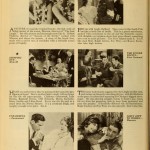
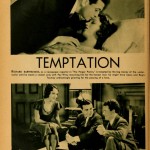
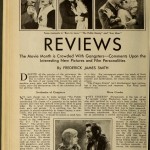

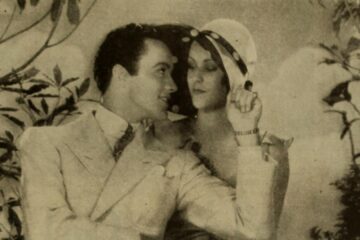


8 Comments
shadowsandsatin · November 24, 2013 at 6:23 pm
This movie seems vaguely familiar to me, and it certainly seems like I have this title in my collection, but if I watched it, it must not have made much of an impression. I must confess, I am just not a Richard Barthelmess fan — he’s like John Boles to me — I just can’t figure out why he made it in the movies. I’m going to check, though — I suspect that I started watching it and gave up, so I’d at least like to try and see it through to the end! Good stuff, as always, Danny.
Danny · November 24, 2013 at 6:32 pm
Thanks again, Karen. I like Barthelmess’ intensity– you can always see a lot going on behind his eyes. This definitely isn’t one of his better entries, though. I also like that he always picked films to make that touched on social issues, even if they look dated today. I admire that kind of verve I guess.
As for this one, yeah, I wouldn’t worry too much about it. It’s pretty forgettable outside some good acting and really suffers from some early talkie problems.
robin · January 8, 2015 at 7:32 am
\Danny I have been trying for a number of years to find this movie for my brother. The Finger Points… It is never on tv. and I have exhausted all the links on the net to watch a free download. Can u help???? Thanks
raja-silk@hotmail.com Robin
Danny · January 8, 2015 at 10:59 am
Sorry, Robin, I don’t have any links to free copies. It was on Warner Archive Instant when I caught it, but I believe it’s not on their service any more. You may want to try asking on their Facebook page about a DVD release, as they’re usually pretty good at letting people know the status of the transfers coming to DVD.
brianpaige · November 30, 2013 at 2:41 pm
Barthelmess is just one of those guys that never entirely made it in talkies. His silent work is generally considered better. I forgot that Toomey was even in this movie but I’ll have to avoid it in the future, haha.
This was actually one of the first movies I ever saw on TCM when I first got the station in 1995. It’s a middling reporter/gangster flick. Too slow though.
Danny · November 30, 2013 at 2:54 pm
I don’t place the film’s failure wholly on Barthelmess, I think this one got bloated up a bit and drags when it shouldn’t. And, yes, the less Toomey, the better.
Too bad. It’s an interesting idea with some good moments, but it’s just too creaky.
Tony Crnkovich · October 22, 2016 at 7:41 am
I have THE FINGER POINTS and watched it again recently. I know it has some awkward moments but, to be honest, I don’t mind them. In fact, I think the ‘roughness’ actually contributes (unintentionally) to the believability of this and other early talkies. In real life people don’t talk and act like they’re always perfectly on cue with each other. There are awkward pauses, wooden or hesitant responses, etc. If someone was to film an every day scene of people interacting, it would likely be flat and somewhat dull, even more so than anything in THE FINGER POINTS. That said, I feel the film gives us an authentic sense of how people behaved in the ’30’s minus the slick, polished performances we think movies are always required to present. All the actors reflect character types that already are, or are fast becoming relics of a bygone era. Richard Barthelmess is mild and naive, Fay Wray is modest and proper, Regis Toomey is the “aww-gee-whiz” pal, and Clark Gable is the tough talking, derbied gangster. Times change and people change with them. It’s great to be able to watch that happen through movies, especially the pre-Code ones.
Vidor · December 23, 2019 at 1:25 pm
Richard Barthelmess and Clark Gable. That’s two careers in opposite directions, right there.
Comments are closed.